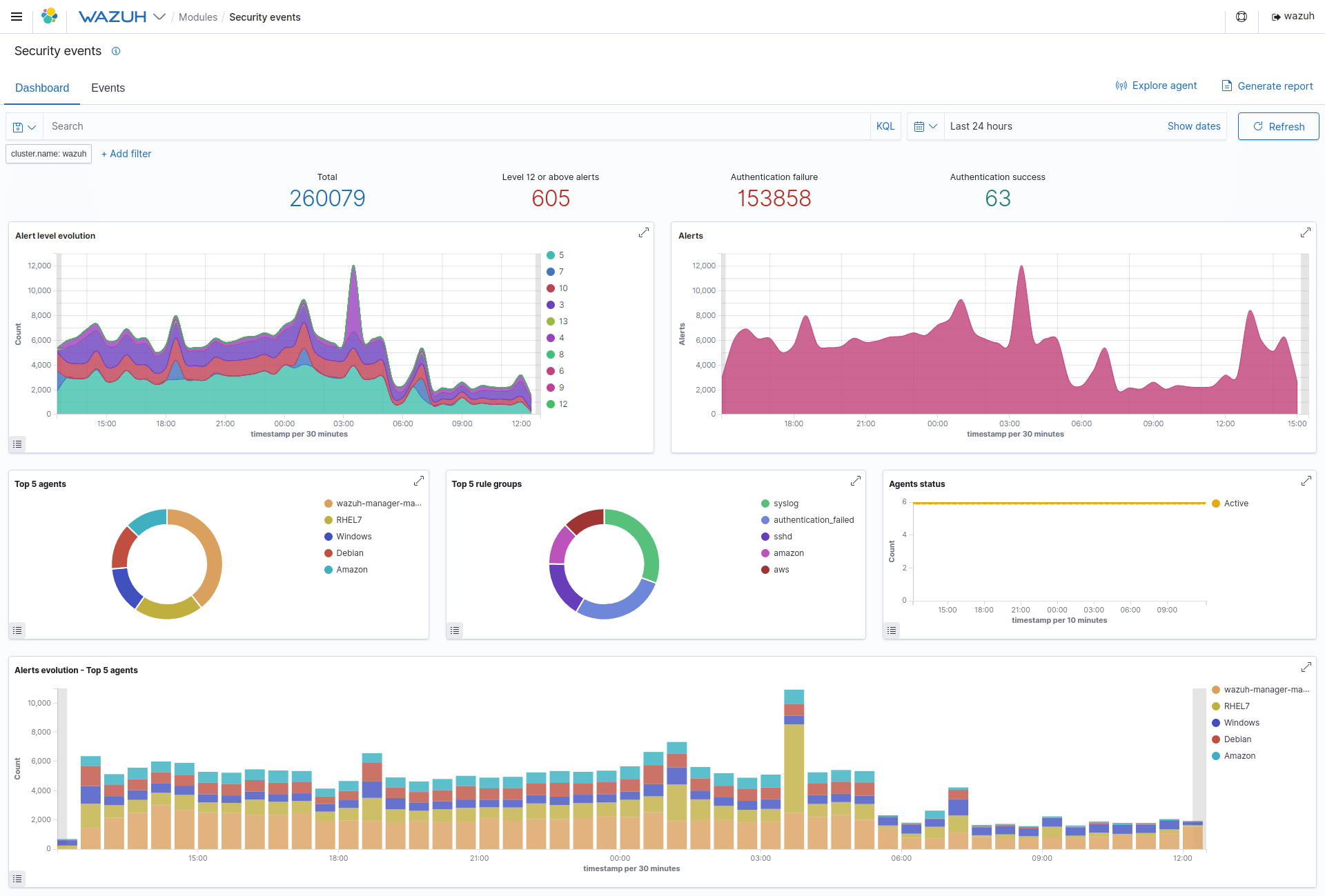Wazuh is a platform used for threat prevention, detection, and response. It is capable of protecting workloads across on-premises, virtualized, containerized, and cloud-based environments.
Wazuh solution consists of an endpoint security agent, deployed to the monitored systems, and a management server, which collects and analyzes data gathered by the agents. Besides, Wazuh has been fully integrated with the Elastic Stack, providing a search engine and data visualization tool that allows users to navigate through their security alerts.
This is free and open source software.
Features include:
- Intrusion detection – agents scan the monitored systems looking for malware, rootkits and suspicious anomalies. They can detect hidden files, cloaked processes or unregistered network listeners, as well as inconsistencies in system call responses.
- Server component uses a signature-based approach to intrusion detection, using its regular expression engine to analyze collected log data and look for indicators of compromise.
- Log data analysis – reads operating system and application logs, and securely forward them to a central manager for rule-based analysis and storage. When no agent is deployed, the server can also receive data via syslog from network devices or applications.
- File integrity monitoring – monitors the file system, identifying changes in content, permissions, ownership, and attributes of files that you need to keep an eye on. In addition, it natively identifies users and applications used to create or modify files.
- File integrity monitoring capabilities can be used in combination with threat intelligence to identify threats or compromised hosts. In addition, several regulatory compliance standards, such as PCI DSS, require it.
- Vulnerability detection – pull software inventory data and send this information to the server, where it is correlated with continuously updated CVE (Common Vulnerabilities and Exposure) databases, in order to identify well-known vulnerable software.
- Configuration assessment – monitors system and application configuration settings to ensure they are compliant with your security policies, standards and/or hardening guides. Agents perform periodic scans to detect applications that are known to be vulnerable, unpatched, or insecurely configured.
- Incident response – out-of-the-box active responses to perform various countermeasures to address active threats, such as blocking access to a system from the threat source when certain criteria are met.
- Regulatory compliance – provides some of the necessary security controls to become compliant with industry standards and regulations. These features, combined with its scalability and multi-platform support help organizations meet technical compliance requirements.
- Cloud security – helps monitoring cloud infrastructure at an API level, using integration modules that are able to pull security data from well known cloud providers, such as Amazon AWS, Azure or Google Cloud. In addition, Wazuh provides rules to assess the configuration of your cloud environment, easily spotting weaknesses.
- Containers security – provides security visibility into your Docker hosts and containers, monitoring their behavior and detecting threats, vulnerabilities and anomalies. The Wazuh agent has native integration with the Docker engine allowing users to monitor images, volumes, network settings, and running containers.
- Wazuh WUI provides a powerful user interface for data visualization and analysis. This interface can also be used to manage Wazuh configuration and to monitor its status.
Website: wazuh.com
Support: GitHub Code Repository
Developer: Wazuh Inc. (based on work by Trend Micro, Inc.)
License: GGNU General Public License v2.0

Wazuh is written in C. Learn C with our recommended free books and free tutorials.
Return to Host-Based Intrusion Detection Systems
| Popular series | |
|---|---|
| The largest compilation of the best free and open source software in the universe. Each article is supplied with a legendary ratings chart helping you to make informed decisions. | |
| Hundreds of in-depth reviews offering our unbiased and expert opinion on software. We offer helpful and impartial information. | |
| The Big List of Active Linux Distros is a large compilation of actively developed Linux distributions. | |
| Replace proprietary software with open source alternatives: Google, Microsoft, Apple, Adobe, IBM, Autodesk, Oracle, Atlassian, Corel, Cisco, Intuit, SAS, Progress, Salesforce, and Citrix | |
| Awesome Free Linux Games Tools showcases a series of tools that making gaming on Linux a more pleasurable experience. This is a new series. | |
| Machine Learning explores practical applications of machine learning and deep learning from a Linux perspective. We've written reviews of more than 40 self-hosted apps. All are free and open source. | |
| New to Linux? Read our Linux for Starters series. We start right at the basics and teach you everything you need to know to get started with Linux. | |
| Alternatives to popular CLI tools showcases essential tools that are modern replacements for core Linux utilities. | |
| Essential Linux system tools focuses on small, indispensable utilities, useful for system administrators as well as regular users. | |
| Linux utilities to maximise your productivity. Small, indispensable tools, useful for anyone running a Linux machine. | |
| Surveys popular streaming services from a Linux perspective: Amazon Music Unlimited, Myuzi, Spotify, Deezer, Tidal. | |
| Saving Money with Linux looks at how you can reduce your energy bills running Linux. | |
| Home computers became commonplace in the 1980s. Emulate home computers including the Commodore 64, Amiga, Atari ST, ZX81, Amstrad CPC, and ZX Spectrum. | |
| Now and Then examines how promising open source software fared over the years. It can be a bumpy ride. | |
| Linux at Home looks at a range of home activities where Linux can play its part, making the most of our time at home, keeping active and engaged. | |
| Linux Candy reveals the lighter side of Linux. Have some fun and escape from the daily drudgery. | |
| Getting Started with Docker helps you master Docker, a set of platform as a service products that delivers software in packages called containers. | |
| Best Free Android Apps. We showcase free Android apps that are definitely worth downloading. There's a strict eligibility criteria for inclusion in this series. | |
| These best free books accelerate your learning of every programming language. Learn a new language today! | |
| These free tutorials offer the perfect tonic to our free programming books series. | |
| Linux Around The World showcases usergroups that are relevant to Linux enthusiasts. Great ways to meet up with fellow enthusiasts. | |
| Stars and Stripes is an occasional series looking at the impact of Linux in the USA. | |
